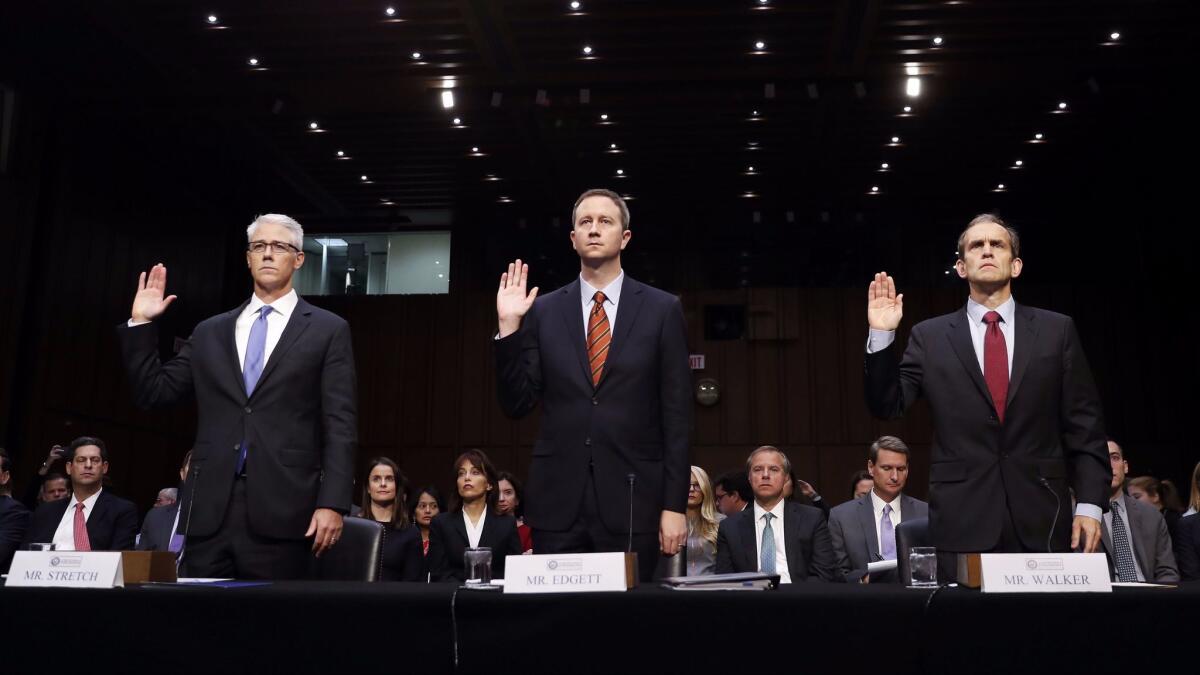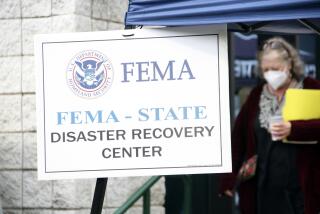Lawmakers slam social media giants for failing to block Russian ads and posts during 2016 campaign

Reporting from Washington — Lawmakers on Wednesday released a dramatic trove of Facebook ads and other social media posts by Russian operatives that sought to aid Donald Trump’s presidential campaign last year and deepen U.S. political divisions over immigration, gay rights, guns, race and religion.
Russian operatives were secretly able to make skilled use of hot-button political issues and sophisticated targeting on Facebook and Instagram to reach nearly 150 million Americans, nearly half the U.S. population, the lawmakers were told.
Members of the House and Senate Intelligence Committees, which held separate hearings Wednesday, leveled blistering criticism at Facebook, Twitter and Google for failing to act aggressively to block Russian use of their social media platforms to sow division before and after last year’s presidential election.
Although most of the Russian ads and posts focused on social issues, some specifically aimed to help Trump and damage his rival, Hillary Clinton. Some urged viewers to attend Trump political rallies, or falsely claimed voters could cast ballots on Twitter. Some of the phony ads received tens of thousands of clicks.
“They were able to develop a significant following for a relatively small amount of money,” Colin Stretch, Facebook’s general counsel, told the House committee. “It was undertaken by people I think who understand social media. These people were not amateurs.”
A Facebook user named “Being Patriotic” posted an ad on July 23, 2016, for example, showing Clinton’s face covered with a black X. It was targeted at Trump supporters in New York and urged them to attend an upcoming rally in Brooklyn. “Hillary Clinton is the co-author of Obama’s anti-police and anti-Constitutional propaganda,” it read.
The ad was traced back to a Kremlin-backed entity in St. Petersburg, Russia. It was bought online and paid for in Russian rubles, costing the equivalent of about $250, according to data that Facebook provided the House committee.
As many as 15,255 Facebook users saw the ad in their news feed and 1,312 clicked on it.
Similarly, a Russian-linked entity calling itself “Heart of Texas” bought an ad denouncing “Obama’s and Hillary’s policy” allowing “illegals” to get “amnesty” in the United States and warned “DON’T MESS WITH TX BORDER PATROL. ALWAYS GUIDED BY GOD.”
It called Clinton “Killary Rotten Clinton” and promoted an event titled “Get Ready to Secede!”
Similarly, an ad on Instagram in August 2016 purchased in rubles by a user named “american.made” showed a photo of Trump giving a thumbs-up. “Florida goes Trump,” read the ad, which was targeted at users who identified themselves as gun owners, conservatives, Trump supporters and tea party members.
In addition to users in Florida, the ad went to Instagram users in Alabama, Georgia, Mississippi and South Carolina. It only received 85 clicks.
Another page called Donald Trump America demanded the “disqualification and removal” of Clinton from the race because of “the dynastic succession of the Clinton family in American politics.” The ad, which cost 14,606 rubles, or about $250, targeted supporters of Donald Trump, Donald Trump for President and Donald Trump Jr.
A Facebook ad by “Secured Borders” did not mention either candidate. It showed a sign reading “No Invaders Allowed” on what appeared to be the southwest border. Data showed that the ad was purchased in Russian rubles, for about $1,600, and was seen by as many as 97,000 Facebook users.
Sen. Richard Burr (R-N.C.), chairman of the Senate Intelligence Committee, said Russian authorities had secretly set up a Facebook account with 250,000 followers that promoted a May 2016 protest at a Houston mosque against “Islamization of Texas” — while another Russian account with 320,000 followers encouraged Muslims to attend a counterprotest.
Dozens of people from both sides showed up and the protests were covered by local news in Houston.
“People were brought together to foment conflict,” Burr said. “Simply put, you must do better to protect the American people, and frankly, your users, from this kind of manipulation.”
Simply put, you must do better to protect the American people, and frankly, your users, from this kind of manipulation.
— Sen. Richard Burr (R-N.C.), chairman, Senate Intelligence Committee
U.S. intelligence agencies have concluded that Russia’s “influence campaign” was aimed at undermining U.S. democracy and helping Trump beat Clinton in the election.
The House and Senate hearings proved far more explosive than a similar hearing Tuesday by the Senate Judiciary Committee.
“Russia exploited real vulnerabilities that exist across online platforms and we must identify, expose, and defend ourselves against similar covert influence operations in the future,” said Rep. Adam Schiff (D-Burbank), the ranking member of the House Intelligence Committee.
Sen. Dianne Feinstein (D-San Francisco), a member of the Senate panel, warned the California-based companies that they needed to be more aggressive at stopping secret foreign use of their technology — or Congress would step in.
“You bear this responsibility. You created these platforms and now they are being misused,” she said. “You have to be the ones to do something about it or we will.”
Republicans noted that Russian efforts were not limited to attacking Clinton and supporting Trump.
Trump has repeatedly dismissed evidence that Russia meddled in the 2016 election as a “hoax.”
Under questioning from Sen. Martin Heinrich (D-N.M.), Stretch conceded that the Russian effort was real, saying the ads on Facebook were “not a hoax.”
Trump also has denounced a criminal investigation into possible collusion between the Trump campaign and Moscow as a “witch hunt.”
On Monday, the special counsel, Robert S. Mueller III, announced charges against three of Trump’s former campaign aides, including one who repeatedly sought to arrange meetings between Trump’s top advisors and senior Russian officials.
Despite growing scrutiny in Washington, Facebook has faced little backlash on Wall Street. The company reported on Wednesday better-than-expected financial results, with revenue jumping 47% to $10.33 billion and profit surging 79% to $4.71 billion in its third quarter. Facebook shares, which have risen nearly 60% this year, dipped slightly in after-hours trading to $179.13.
Twitter: @davidcloudLAT
UPDATES:
4 p.m.: This article was updated to include details about Facebook’s financial results.
3:15 p.m.: This article was updated with additional details from the hearings.
This article was originally published at 12:45 p.m.
More to Read
Sign up for Essential California
The most important California stories and recommendations in your inbox every morning.
You may occasionally receive promotional content from the Los Angeles Times.











